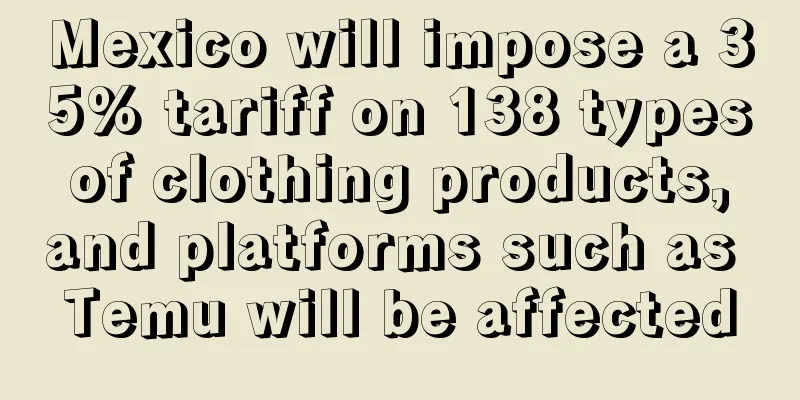Mexico will impose a 35% tariff on 138 types of clothing products, and platforms such as Temu will be affected

|
It is learned that the Mexican government recently announced that it will implement a new tariff policy on imported textiles from Asia before 2026, mainly targeting Asian countries such as China. This measure will impose a 35% import tax on 138 types of clothing products and a 15% import tax on 17 types of textiles. The move is aimed primarily at curbing textile imports from low-priced markets, and the Mexican government stressed that the measures target specific categories of products rather than a single country. The tax is intended to protect local industries and jobs as Mexico's textile industry has seen its gross domestic product fall by 4.8% in recent years and lost 79,000 jobs. It is understood that this new tax policy does not apply to countries that have signed free trade agreements with Mexico, especially Mexico's largest trading partner, the United States. Therefore, textile imports to the United States will not be affected by this policy. Data shows that in 2023, Mexico's main sources of textile imports include China (US$4.6 billion), the United States (US$3.2 billion), Vietnam (US$665 million), Bangladesh (US$595 million) and India (US$472 million). In particular, low-priced textiles imported through e-commerce platforms such as Shein, Temu and AliExpress have a significant incremental impact on the Latin American market, which is one of the reasons why the Mexican government introduced this new policy. In addition, the situation in Mexico and other Latin American countries is also changing. For example, Chile and Brazil recently abolished the tax-free policy for low-cost goods purchased on such e-commerce platforms, setting a tax-free cap of $41 and $50 respectively. The introduction of this policy by Mexico comes at a time when the global trade environment is changing, especially in the Americas. During President Trump's term, the United States promised to impose a 25% tariff on all Mexican imports to encourage Mexico to strengthen its crackdown on illegal immigration and smuggling. This new tax policy also reflects, to a certain extent, the Mexican government's game between globalization and the protection of local industries. Author✎ Summer/ |
>>: Home Depot leads U.S. home improvement spending share, Amazon in third
Recommend
What is SCA certification? SCA certification evaluation
SCA is a new form of two-factor authentication des...
Amazon loophole allows unlimited reviews?
Recently, a new "black technology" metho...
What is Fiverr? Fiverr Review
Fiverr is a task crowdsourcing platform, and the t...
What is JuDe Intellectual Property? JuDe Intellectual Property Review
Guangzhou Jude Management Consulting Co., Ltd. is ...
Amazon US encourages marijuana legalization! And allows hiring marijuana smokers!
Amazon is allowing employees who smoke marijuana t...
Big news! Starting September 1st, the US seller information column will directly display the name and address!
On June 24, 2020, Amazon announced the establishme...
What is the Italian Tax Agency? Italian Tax Agency Review
The Agnzia Entrepreneurship Agency is the tax agen...
What is livieandluca? livieandluca review
Livieandluca is a handmade shoe with extraordinary...
What is Amazon Home Services? Amazon Home Services Review
Amazon Home Services is a program launched by Amaz...
Amazon strikes hard! Under the epidemic, it is not easy for all living beings!
As the new coronavirus spreads around the world, E...
Sellers beware! Amazon has recently seen a large number of these emails!
Recently, a new method of email phishing scam has...
What is markāi? Markāi Review
markāi Markāi focuses on acquiring and developing ...
What is Yuwen Cross-border? Yuwen Cross-border Review
Yuwen Cross-border (Sichuan Yuwen Technology Co., ...
Klarna releases first half and Q2 results, CEO says ready for IPO at any time
It is learned that on August 31, BNPL payment gian...
Cutting excess inventory and subletting large warehouses! What signal is Amazon sending?
It is learned that according to foreign media repo...









